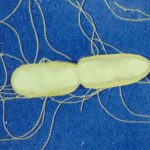Link to Pubmed [PMID] – 32477304
Link to DOI – 10.3389/fmicb.2020.00889
Front Microbiol 2020 ; 11(): 889
Salmonella enterica subsp. enterica serovar Derby is one of the most frequent causes of gastroenteritis in humans. In Europe, this pathogen is one of the top five most commonly reported serovars in human cases. In France, S. Derby has been among the ten most frequently isolated serovars in humans since the year 2000. The main animal hosts of this serovar are pigs and poultry, and white meat is the main source of human contamination. We have previously shown that this serovar is polyphyletic and that three distinct genetic lineages of S. Derby cohabit in France. Two of them are associated with pork and one with poultry. In this study, we conducted a source attribution study based on single nucleotide polymorphism analysis of a large collection of 440 S. Derby human and non-human isolates collected in 2014-2015, to determine the contribution of each lineage to human contamination. In France, the two lineages associated with pork strains, and corresponding to the multilocus sequence typing (MLST) profiles ST39-ST40 and ST682 were responsible for 94% of human contaminations. Interestingly, the ST40 profile is responsible for the majority of human cases (71%). An analysis of epidemiologic data and the structure of the pork sector in France allowed us to explain the spread and the sporadic pattern of human cases that occurred in the studied period.

